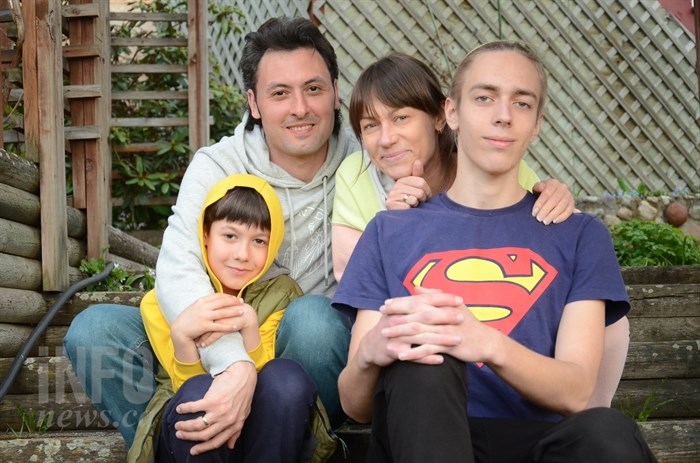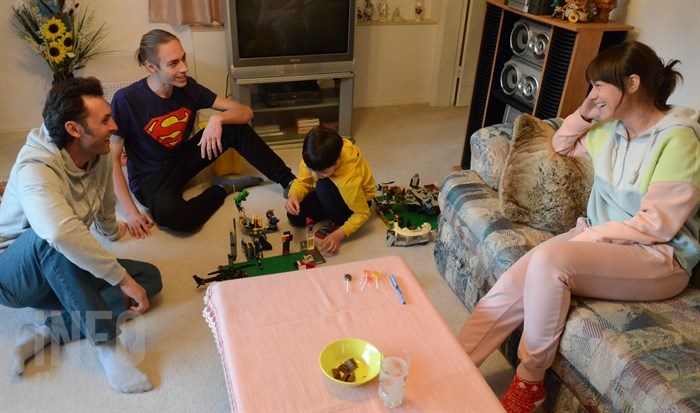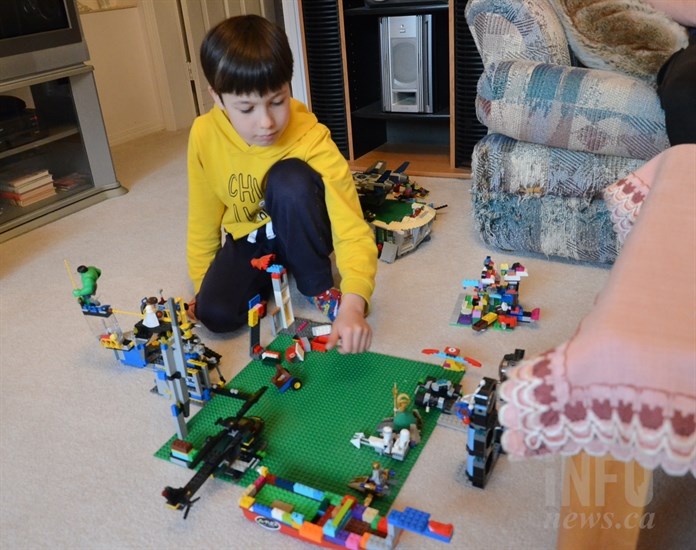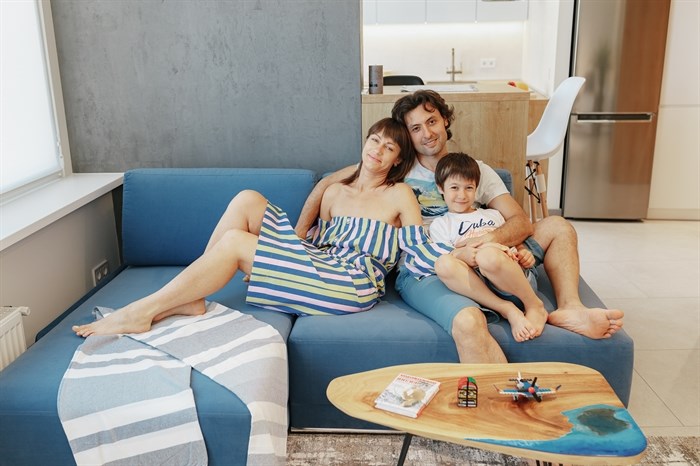
Fedir Solovei and Olena Fodorova with their two children, Mykyta and Artem in Vernon.
(BEN BULMER / iNFOnews.ca)
May 01, 2022 - 6:45 AM
At 5:30 a.m. on February 24, Fedir Solovei was woken up by a phone call from his 16-year-old son.
"He asked me whether I heard explosions," Solovei said. "I said 'no.'"
"Then (his son) said, quite near to his house, he heard several explosions. I took my phone out and understood that the war had begun."
Two months later, Solovei recalls the story while sitting in the Vernon basement which has become his family's new home.
Solovei said he knew the war was inevitable and that the family had a plan of what to do.
Living in the Ukrainian coastal city of Odesa, the family would head to Moldova, only 40 kilometres away.
But crossing an international border at a moment's notice isn't so straightforward.
He headed to the passport office to get a passport for his six-year-old son, Mykyta. He also required permission to take his 17-year-old stepson, Artem, out of the country. He then got his second COVID shot.
He also needed to find gas. Not an easy feat on the first day of what quickly became a bloody war.
He called his brother-in-law who had gas in his car and together with his family, seven people crammed into the vehicle and drove to the Moldova border.
The line-up at the border to cross into Moldova was three kilometres long.
Together with his wife, Olena Fodorova, and their two children, they made it.
Solovei didn't realize it at the time, but if they'd been delayed by just 10 minutes more, he would not have been allowed to leave Ukraine.
At midnight that day, a law prohibiting men between 18 and 60 years old from leaving the country came into effect.
The 39-year-old crossed the border at 11:50 p.m.
Solovei said the only reason he and his family managed to leave Ukraine so quickly is that they lived so close to the border and they acted quickly.
"Many (Ukrainians) didn't expect that it could be," he said. "Many people denied the possibility that this war could start."
So why is that?
"Can you imagine that tomorrow that Canada will be attacked by rockets?" he asked.
The answer is obviously no.
He said Ukrainians felt the same way.
"When you live a normal peaceful life you have your own plans, everything going well, you have a business, you have plans for many years, it's unbelievable," he said.
Once in Moldova, the family drove to the capital Chisinau, and stayed in a friend's RV, before a hotel turned all its rooms over to Ukrainians who had fled the war.
The family applied for a Canadian visa and Solovei says he spent his days ferrying people from the Moldova border to Chisinau.
Amazingly, the family's visa was processed in about a week and on April 5 the family arrived in Canada.
Now, thousands of miles away from Ukraine, and the war that is destroying the country, he reflects on the journey.
"We were lucky that our children noticed nothing about the war, this is very, very important... (for) their mental health," Solovei said.
The couple did hear explosions themselves and Solovei said he and Fodorova would both wake up in shock to the smallest sound the first week after they left the country.

The family at home in Vernon.
(BEN BULMER / iNFOnews.ca)
So was he scared?
"No," he replies. "When you get in a critical situation it requires consolidation and just to do what you have to do."
While he didn't know what was ahead of him, he did know the family had to leave the country.
So why Canada?
"It's like National Geographic 360 degrees around me," he jokes.
His mother also lives in Vernon.
Solovei's mother married a Vernon resident she met in Odesa and moved to Vernon three years ago.
The family is currently staying in Solovei's mother's basement.
They want to find their own place, and heading to see an apartment this week.
Surrounded by fields on the edge of Coldstream, their new temporary home is different from the urban life of Odesa.
They were living in a condo on the 21st floor, with views over the Black Sea.
They say they could see the Russian warships on the horizon.
The family owns half a dozen apartments and rents them out as vacation rentals.
"We invested in (the) property market, bought apartment, do renovations (and) sell them," Solovei says.
Apart from the fact, that his mother lives in Canada, Solovei said he'd always wanted to come to B.C. The family had a trip planned in 2016 for Solovei to compete in a paragliding competition but it fell through.
They'd been to Oregon the year before – again to compete in paragliding – and fell in love with the Pacific Northwest.
They didn't think they'd have to come under such circumstances.
Solovei's handyman skills from fixing up apartments have come in handy and he quickly scored a job as a carpenter.
He can't speak highly enough about his employer who he says treats him like a member of the family. As he's without a vehicle they pick him up for work each morning.
Fodorova, who ordinarily works as a relationship counsellor for women, has a job as an administrator.
"Often I don't understand what people say because they have (an) accent," she says. "I need to speak by telephone and it's very difficult."
Her English is decent, but it's hard to fathom how difficult it would be to work in an environment where it took so much energy just trying to understand what people were saying. Especially when you've just fled a war-torn country.
She also praises her employer highly.
"(The) owner of this shop is a very good man, he hope that I study fast," she says.
Artem, 17, is due to start at Kalamalka Secondary school next week. He says he's excited, and a little nervous.

Mykyta, 6, plays with his lego.
(BEN BULMER / iNFOnews.ca)
And indeed, the reception they've received since coming to Canada would make many people proud.
"We have no words to express our feeling about Canadians and all people who live here, it's unbelievable," Solovei said.
They speak of multiple examples of kindness.
A stranger heard them speaking Ukrainian while they were in the bank. The stranger slipped them a note with their phone number saying they knew they were Ukrainian and if they ever needed to give them a call.
A hairdresser cutting Solovei's hair teared up when he told her where he was from. She then refused payment for his haircut.
"This is everywhere," he says.
Six-year-old Mykyta sits on the floor quietly playing with Lego.
"All these toys were brought by people," Solovei says.
And he may not need a lift to work anymore. A couple of days ago someone loaned him their car. They said he can use it for the next three months.
Over the course of our two-hour chat, both Solovei and Fodorova express their gratitude to Canada multiple times.
From the Canadian government that processed their visa's so quickly, to the stranger that dropped off two bikes for the kids.
Solovei says he has the words in Ukrainian but doesn't know how to express his thankfulness in English. He puts his hand on his heart and it's obvious what he means.
While their situation in Canada is filled with hope, there is still a horrific war taking place in their home country.
They talk about the atrocities committed by Russian troops. The looted homes, the woman that were raped, and the senseless killing.
While Odesa had largely been spared from the war, the Russians have fired at the city of one million people.
Fodorova shows pictures on her phone of where rockets hit just 500 metres from her father's home in Odesa. Solovei used to go to the gym in the same building.
Seven people died in the attack, she says, including a baby, the mother and the grandmother.
She's worried about her father. He doesn't want to leave Ukraine but now after the rocket attack, he's starting to think about it.
"All his soul is there in Ukraine and his city," she says.
Her dad goes around daily to the family's apartments and checks on them and waters the flowers.
It's a degree of normalcy in a situation far from normal.
Surprisingly, Solovei says people are still going to work.
"It's not normal, but if you can work you have to work," he says.
Fodorova's brother recently arrived in Canada, and Solovei's ex-wife and their 16-year-old son are safely in Moldova.
Not all their family members are so lucky, with others living in areas now occupied by Russian troops.
"But at this moment all my friends are alive," he says.
Does he feel guilty for leaving?
"Maybe a little bit," he says. "But I understand that in the long term our decision and our choice will be more... better for our children."

Happy days: The family at home in their condo in Odesa, Ukraine.
Image Credit: SUBMITTED: Fedir Solovei
To contact a reporter for this story, email Ben Bulmer or call (250) 309-5230 or email the editor. You can also submit photos, videos or news tips to the newsroom and be entered to win a monthly prize draw.
We welcome your comments and opinions on our stories but play nice. We won't censor or delete comments unless they contain off-topic statements or links, unnecessary vulgarity, false facts, spam or obviously fake profiles. If you have any concerns about what you see in comments, email the editor in the link above.
News from © iNFOnews, 2022